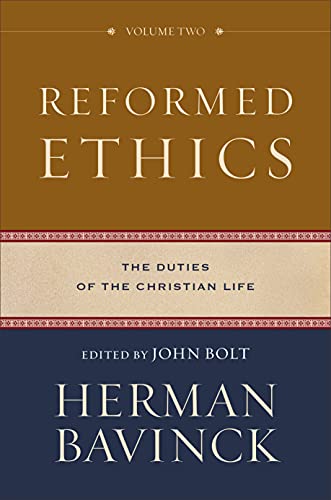A Brief Book Summary from Books At a Glance
by Steve West
About the Author
Herman Bavinck (1854-1921) was an important theologian, professor, and author in the Dutch-Calvinistic tradition. Today he is best known for his multi-volume Reformed Dogmatics, but Reformed Ethics is also a significant and influential addition to the field of ethics from a Reformed perspective.
Table of Contents
[Note: This second volume of Bavinck’s Ethics is a continuation of the first volume, and so the chapter numbers begin with 13 since the first volume ended with chapter 12.]
Chapter 13 Duties, Precepts and Counsels, Adiaphora
Chapter 14 Collision and Classification of Duties
Chapter 15 No Other Gods; No Images
Chapter 16 The Honor of God’s Name
Chapter 17 The Sabbath
Chapter 18 General Bodily Duties to Self
Chapter 19 Basic Necessities of Bodily Life
Chapter 20 Bodily Duties to Our Souls
Chapter 21 Loving Our Neighbor
Summary
Chapter 13: Duties, Precepts and Counsels, Adiaphora
Duty and obligation involve binding our consciences to law. There are absolute obligations tied to what is intrinsically good, and there are relative obligations tied to what is permissible. Precepts represent the former category and counsels the latter. It is a false dichotomy to set morality as imitating Christ over and against morality as following the law. Christ did not come to abolish the law but to fulfill it, strengthening the law, properly interpreting it, and showing the riches of its spiritual significance. The Apostles followed Torah, but were able to move past the ceremonial laws which were fulfilled by Christ and into the freedom of Christian liberty in the Spirit. Biblically speaking, we are to ask about our relationship to the law rather than about our relationship to duty. The law does not give life, but neither does it condemn those who are in Christ. In Christ and the Spirit, believers are empowered to joyfully obey God’s law in freedom, demonstrating their new life in him. By faith we uphold the moral content of the law. The Spirit does not reveal different content, but helps God’s children see the meaning of the law. Christians obey the law and fulfill their duties out of love for God.
In the Reformed tradition of ethics, the Decalogue is central to moral commands. Christians are not legalistic (practicing nomism), but neither are they lawless (practicing antinomianism). The ontological nature of God, and our ontological nature as creatures bearing his image, require the upholding of God’s law. Love is the one word that summarizes the law, and the Golden Rule (Matt 7:12) is the central principle of duty. Christianity does have both precepts and counsels, but the latter are not to be restricted to a uniquely spiritual subset who have received a higher calling. As in philosophy, theologians have debated adiaphora (i.e., things that are indifferent morally); many are not convinced that this is a legitimate category. In Scripture, freedom is in the law, not outside of the law, so discussions about things that are permissible need to take place in that context. There are numerous things that may be done, but nothing should be done that is proscribed by God’s law. Proscription presupposes sin, and since God’s law is given to a sinful people, there are many commands cast in a negative form. . . .
[To continue reading this summary, please see below....]The remainder of this article is premium content. Become a member to continue reading.
Already have an account? Sign In
